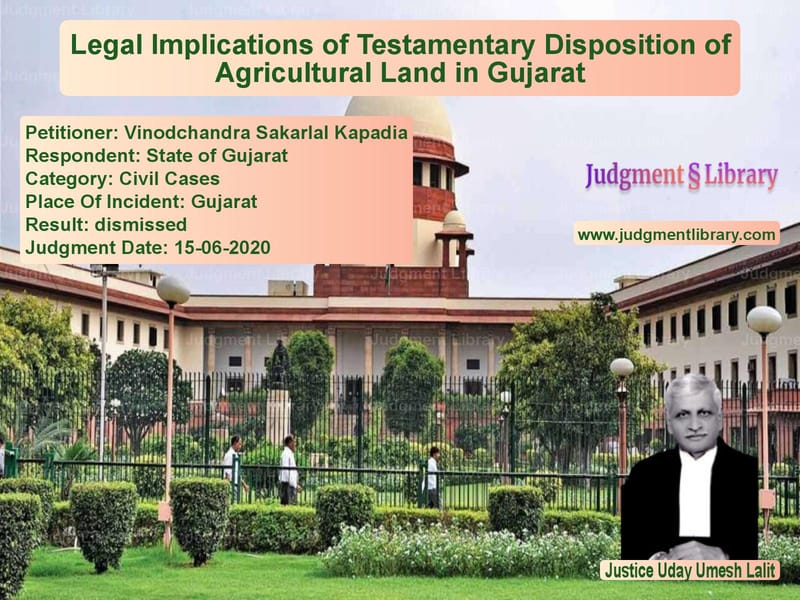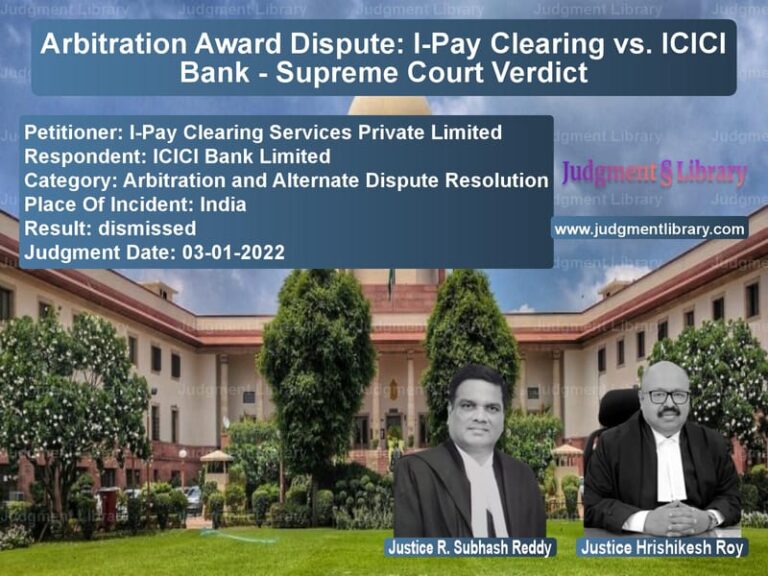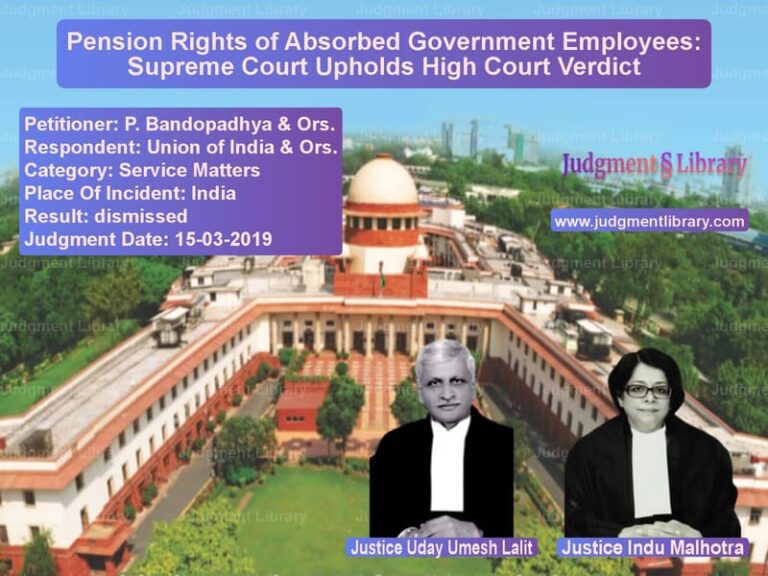Legal Implications of Testamentary Disposition of Agricultural Land in Gujarat
The case of Vinodchandra Sakarlal Kapadia vs. State of Gujarat raises an important legal issue regarding the testamentary disposition of agricultural land under the Bombay Tenancy and Agricultural Lands Act, 1948.
The Supreme Court had to determine whether a tenant can bequeath agricultural land to a non-agriculturist through a Will and whether such a transfer is valid under the provisions of the Act.
The case involves a crucial interpretation of Sections 43 and 63 of the Act, which impose restrictions on the transfer of agricultural land.
The judgment carefully analyzed the legislative intent behind these provisions and their impact on land ownership rights. It also reviewed prior judicial precedents to provide a comprehensive legal analysis.
Background of the Case
The matter originated when the appellant, Vinodchandra Sakarlal Kapadia, claimed ownership of agricultural land on the basis of a Will executed by the previous owner.
The appellant contended that a Will does not constitute a transfer under the Bombay Tenancy and Agricultural Lands Act and that such a transfer is not barred under Section 63 of the Act.
The State of Gujarat opposed this claim, arguing that any transfer of agricultural land to a non-agriculturist, including a testamentary transfer, is barred under the Act.
The State maintained that allowing such a transfer would defeat the very purpose of the Tenancy Act, which seeks to protect agricultural land from being acquired by non-agriculturists.
Legal Provisions and Key Issues
The two major legal provisions under scrutiny in this case were:
- Section 43: This provision imposes restrictions on the transfer of land purchased under the Act. It explicitly prohibits the sale, gift, exchange, mortgage, lease, or assignment of such land without prior approval from the Collector.
- Section 63: This section bars the transfer of agricultural land to a non-agriculturist unless prior permission is obtained. The primary objective of this section is to ensure that agricultural land remains with those who cultivate it.
The central issue before the Supreme Court was whether the term “assignment” in Section 43 includes a testamentary disposition and whether the absence of this term in Section 63 allows agricultural land to be passed on through a Will.
Arguments of the Petitioner
The petitioner, Vinodchandra Sakarlal Kapadia, put forth the following arguments:
- The prohibition under Sections 43 and 63 applies only to inter vivos transfers (transfers between living persons) and does not extend to testamentary dispositions.
- The word “assignment” in Section 43 should be interpreted ejusdem generis (of the same kind) with the other terms used in the section, such as sale, gift, and mortgage, all of which pertain to transfers during the lifetime of the owner.
- The Indian Succession Act, 1925, governs testamentary succession, and being a central legislation, it prevails over any inconsistent provisions of a state law.
- The Bombay High Court had previously ruled in favor of allowing testamentary transfers in similar cases, supporting the contention that such transfers do not fall under the restriction imposed by the Tenancy Act.
- Sections 43 and 63 do not specifically prohibit testamentary dispositions. If the legislature intended to restrict inheritance through a Will, it would have explicitly mentioned it in the Act.
Arguments of the Respondent (State of Gujarat)
The State of Gujarat presented the following arguments:
- The primary objective of the Tenancy Act is to protect agricultural land from being acquired by non-agriculturists.
- Allowing a non-agriculturist to inherit agricultural land through a Will would defeat the legislative intent behind Sections 43 and 63.
- Although Section 63 does not explicitly mention “assignment,” testamentary disposition should be included within its scope, as it would otherwise create a loophole allowing land to be transferred in violation of the Act’s purpose.
- Judicial precedents from other states, particularly under similar land reform laws, have ruled against testamentary transfers of agricultural land to non-agriculturists.
- The Gujarat High Court had previously ruled that testamentary transfers of agricultural land to non-agriculturists violate the Act and should not be permitted.
Supreme Court’s Analysis and Judgment
The Supreme Court analyzed various judicial precedents and statutory provisions before arriving at its decision. The key points of the Court’s analysis were:
- A Will constitutes a mode of transfer of property, even though it takes effect after the death of the testator.
- The purpose of the Tenancy Act is to ensure that agricultural land remains with cultivators and is not diverted to non-agriculturists.
- If a testamentary transfer were allowed, it would create an indirect means of circumventing the restrictions imposed by Sections 43 and 63.
- The legislative history of land reform laws across India shows that similar statutes have been interpreted to restrict both inter vivos and testamentary transfers.
- The Court cited previous judgments where similar provisions were interpreted to prohibit testamentary transfers, reinforcing the view that such transfers violate the objectives of the Act.
Accordingly, the Supreme Court upheld the Gujarat High Court’s decision and ruled that the testamentary disposition of agricultural land to a non-agriculturist is prohibited under the Bombay Tenancy and Agricultural Lands Act, 1948.
Impact of the Judgment
This landmark ruling has significant implications for agricultural land laws in India:
- It clarifies that agricultural land cannot be transferred to non-agriculturists, even through a Will.
- It reinforces the objectives of land reform laws aimed at preventing fragmentation and urbanization of agricultural land.
- It provides guidance for similar cases in other states, ensuring uniformity in the interpretation of land laws.
- It upholds the legislative intent of protecting cultivators from losing their land to non-agriculturists.
Conclusion
The judgment in Vinodchandra Sakarlal Kapadia vs. State of Gujarat sets an important precedent in land law jurisprudence.
The Supreme Court has reinforced the legislative intent of land reform laws, ensuring that agricultural land remains within the hands of cultivators.
This ruling prevents the misuse of testamentary transfers as a means to bypass statutory restrictions on land transfers, thereby upholding the core objectives of agrarian reform.
The case serves as a reminder that statutory restrictions on land ownership must be interpreted in light of their purpose, and courts must ensure that legislative intent is not defeated through indirect means.
It also emphasizes the role of judicial interpretation in maintaining the balance between individual property rights and the broader goals of land reform.
Petitioner Name: Vinodchandra Sakarlal Kapadia.Respondent Name: State of Gujarat.Judgment By: Justice Uday Umesh Lalit.Place Of Incident: Gujarat.Judgment Date: 15-06-2020.
Don’t miss out on the full details! Download the complete judgment in PDF format below and gain valuable insights instantly!
Download Judgment: Vinodchandra Sakarla vs State of Gujarat Supreme Court of India Judgment Dated 15-06-2020.pdf
Direct Downlaod Judgment: Direct downlaod this Judgment
See all petitions in Property Disputes
See all petitions in Succession and Wills
See all petitions in Landlord-Tenant Disputes
See all petitions in Specific Performance
See all petitions in Judgment by Uday Umesh Lalit
See all petitions in dismissed
See all petitions in supreme court of India judgments June 2020
See all petitions in 2020 judgments
See all posts in Civil Cases Category
See all allowed petitions in Civil Cases Category
See all Dismissed petitions in Civil Cases Category
See all partially allowed petitions in Civil Cases Category







